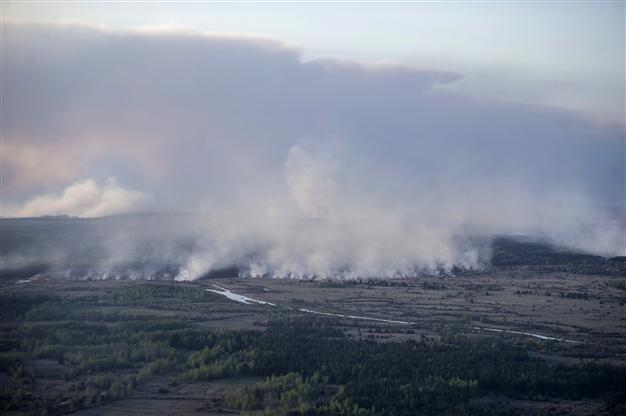Chernobyl wildfire controlled: Ukraine
KYIV - Agence France-Presse

AFP Photo
Firefighters have brought under control a forest fire near Ukraine's Chernobyl plant, scene of the world's worst nuclear accident in 1986, the emergency services said on April 29.The blaze came within about 20 kilometres (12 miles) of Chernobyl after breaking out April 28 afternoon, but officials said it posed no danger to the plant and radiation levels in the zone remained unchanged.
"At 6:00 am local time (0300 GMT), the fire was controlled and stopped," the emergency services said in a statement.
"Work is continuing to extinguish the fire."
The area around Chernobyl was evacuated after the 1986 blast and the last reactor there shut down in 2000 but some personnel still operate in the exclusion zone, where work is underway to build a new seal over the reactor site.
The government said the fire had spread across some 320 hectares near the plant, which is about 100 kilometres (62 miles) from the Ukrainian capital Kyiv.
More than 300 firefighters with scores of vehicles battled the blaze and aircraft dumped water on the flames.
Police said that they evacuated several people who had been living as squatters in the area, for their safety.
Officials gave few details of the possible cause of the fire but Ukraine's Interior Minister Arsen Avakov said authorities had not ruled out arson.
A state nuclear inspection official told AFP late April 28 that "the level of radiation at the Chernobyl plant had not changed".
The fire struck just two days after Ukrainians marked 29 years since the Chernobyl nuclear disaster.
The explosion of reactor number four on April 26, 1986 spewed poisonous radiation over large parts of Europe, particularly Ukraine, Belarus and Russia.
The human toll of the disaster is still disputed.
United Nations experts officially recognised 31 deaths among plant workers and firefighters directly linked to the blast.
But environmental group Greenpeace said there could be around 100,000 additional deaths from cancer caused by the disaster.
















